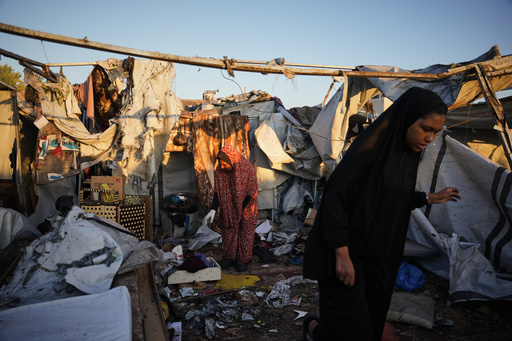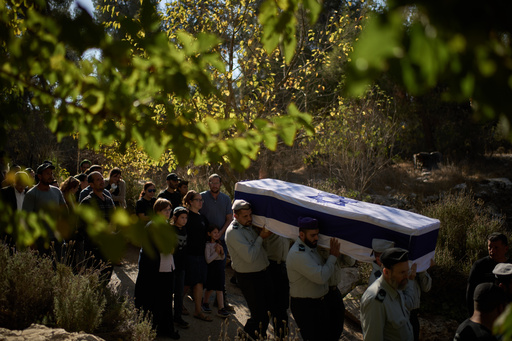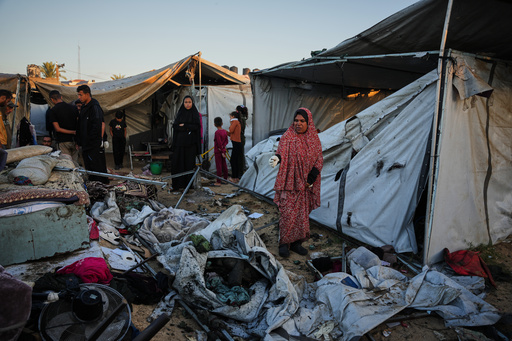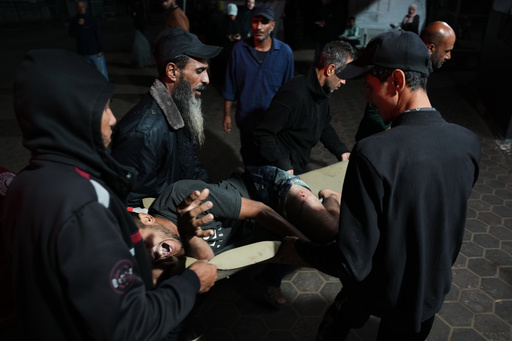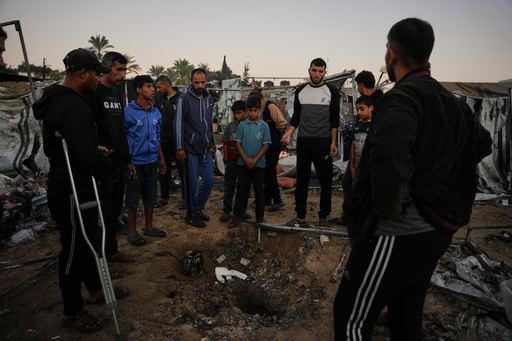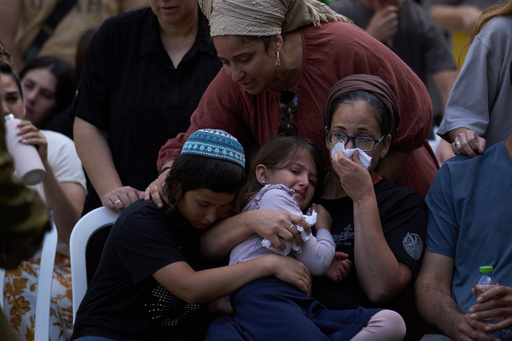Israel's military says ceasefire is back on as death toll from overnight strikes in Gaza reaches 104
News > International News

Audio By Carbonatix
11:18 PM on Tuesday, October 28
By WAFAA SHURAFA and JOSH BOAK
DEIR AL-BALAH, Gaza Strip (AP) — Israel’s military said Wednesday that the ceasefire was back on in Gaza after it carried out heavy airstrikes overnight across the Palestinian territory that killed 104 people, including 66 women and children, according to local health officials.
The strikes, the deadliest since the ceasefire began on Oct. 10, marked the most serious challenge to the tenuous truce to date.
The bombardment pointed to Israel’s readiness to strike hard at what it says are Hamas violations of the ceasefire deal. Meanwhile the militant group denies it is responsible and blames Israel for violations.
After it announced the restoration of the ceasefire, the Israeli military said it carried out another airstrike in northern Gaza, targeting what it called a site where weapons were being stored for an imminent attack. Al-Shifa Hospital in Gaza City said it received two bodies from the strike.
The latest violence puts new strains on American pressure to keep the ceasefire on track. U.S. President Donald Trump defended Israel's strikes but also insisted the escalation won't wreck the truce.
Israel said its overnight strikes were in retaliation for the shooting and killing of an Israeli soldier in Rafah, the southernmost city in Gaza. Prime Minister Benjamin Netanyahu also said Hamas violated provisions in the deal concerning the handover of remains of hostages.
Hamas denied any involvement in the deadly shooting and, in turn, accused Israel of “a blatant violation of the ceasefire deal.” It also said it would delay handing over the body of another hostage to Israel because of the strikes.
The strikes across Gaza in the early hours Wednesday pounded buildings and tent camps housing displaced families.
Ambulances and small trucks carrying bodies crowded hospital entrances. In Deir al-Balah, bodies were wheeled in on stretchers or carried on mattresses. One man walked into a hospital carrying the body of a young child.
“They burned children while they were asleep,” Haneen Mteir, whose sister and nephews were killed in a strike, shouted at the morgue in at Nasser Hospital in the southern city of Khan Younis.
The Palestinian Health Ministry said at least 104 people, including 20 women and 46 children, were killed in the overnight strikes and 253 people were wounded, most of them women and children.
The Israeli military said in a statement Wednesday that it struck dozens of Hamas targets, including individuals, observation posts, weapons depots, mortar firing positions and tunnels.
It said it hit a number of senior Hamas fighters, including 21 commanders of various levels. It said they included militants involved in the Oct. 7, 2023, Hamas-led attack on Israel that started the war, including Nukhba company commander Hatem Maher Mousa Qudra, who led the attack on the Ein Hashlosha Kibbutz, the statement said.
The military said it would continue to “respond firmly and act decisively to eliminate any threat to the State of Israel.”
Israel’s Foreign Ministry spokesperson Oren Marmorstein said Hamas was responsible for the consequences of its ceasefire violation and attributed the high death toll to the militant group using civilians as human shields.
Throughout the war, Israel has often hit targets it says are Hamas figures while in their homes or shelters where their families are also located alongside other families.
An Israeli military official said Wednesday that the soldier in Rafah, identified as Master Sgt. Yona Efraim Feldbaum, 37, was killed by “enemy fire” that targeted his vehicle on Tuesday.
The official, who spoke on condition of anonymity to discuss confidential military operations, said Israeli troops in the area came under attack numerous times on Tuesday as they worked to destroy tunnels and Hamas infrastructure. The Israeli military has leveled almost the entire city of Rafah over the past months, demolishing nearly every building, according to satellite photos.
Hamas insisted it was not involved in the Rafah gunfire, reiterated its commitment to the ceasefire and called on mediators to pressure Israel to stop.
Marmorstein, the Foreign Ministry spokesman, said Washington was informed about the strikes and that they were carried out in full coordination with the United States.
Trump, on a trip to Asia, defended the strikes, saying Israel was justified in carrying them out after Hamas killed the Israeli soldier, who also held U.S. citizenship.
Trump said Israel “should hit back” when its troops come under attack. But he said he’s still confident the ceasefire would withstand the escalation in violence because “Hamas is a very small part of the overall Middle East peace. And they have to behave.”
If not, they will be “terminated,” Trump added.
Netanyahu accused Hamas of violating the ceasefire by handing over body parts this week that Israel said were partial remains of a hostage recovered earlier in the war. Israeli officials also accused Hamas of staging the discovery of some of the remains Monday, sharing a 14-minute, edited video from a military drone.
Hamas replied in kind on Wednesday, saying the Israeli strikes reveal “a clear Israeli intention to undermine the ceasefire agreement and impose new realities by force.” The group also said in a statement that the U.S. is offering Netanyahu a “political cover” to carry on with its aggression in Gaza.
The prime minister of Qatar, which mediated the ceasefire deal along with the U.S. and Egypt, said there was a violation of the ceasefire agreement “by the Palestinian party,” but it was unclear if Hamas was affiliated with the gunmen responsible.
The fighting was “very disappointed and frustrating for us,” Sheikh Mohammed bin Abdulrahman Al Thani said, speaking at the Council on Foreign Relations in New York. “We’ve been engaging in a very intensive way with both parties in order to ensure that the ceasefire holds.”
The ceasefire deal requires Hamas to return all the remains of hostages in Gaza as soon as possible.
Hamas has said it is struggling to locate the bodies of the hostages amid the vast destruction in Gaza, while Israel has accused the militant group of purposely delaying their return.
There are still 13 bodies of hostages in Gaza and their slow return is complicating efforts to proceed to the ceasefire’s next phases, which address even thornier issues, including the disarmament of Hamas, deployment of an international security force in Gaza and deciding who will govern the territory.
In Gaza, Palestinians were reeling after the strikes. At dawn, Palestinians at a displaced camp cleared remains of a destroyed tent next to a crater. They found the body of a small child and wrapped it in a blanket.
“What kind of a ceasefire is this?” Amna Qrinawi said.
At Al-Awda Hospital in central Gaza, scores of people gathered around dozens of bodies wrapped in white shrouds for funeral prayers.
Yehya Eid, who said he lost his brother and nephews, wept over a small body in a bloodied white shroud outside the hospital. He said the strike came without warning.
“These are children who were killed. What did they do wrong? Did they fight in the war?” Eid asked.
Israel's two-year campaign in Gaza has killed more than 68,500 Palestinians, according to Gaza’s Health Ministry, which doesn’t distinguish between civilians and combatants in its count. The ministry maintains detailed casualty records that are seen as generally reliable by U.N. agencies and independent experts. Israel has disputed them without providing its own toll.
